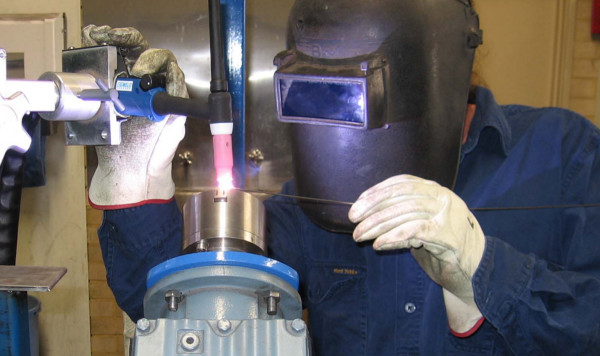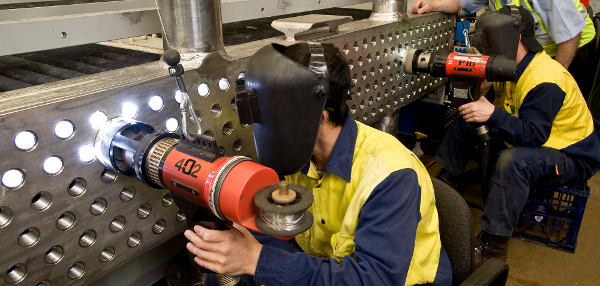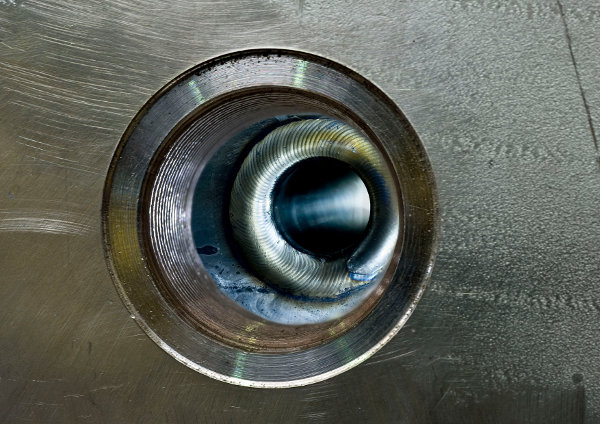WelderDestiny › Welder Career Progression
Welder Career Progression
Society is changing so rapidly today that advice about Welder career progression needs to not only look at the present situation, but also give some ideas about where things can go in the medium term future. As I do not profess to have any prophetic gifts in this regard, any prediction about possible future directions of a Welder’s career needs to be seen as just that. A prediction. At best, we can only make predictions about the future of welding as a career, in the light of direction rather than destination. The road we are on is about finding the right direction rather than predicting what the destination will look like.
The WelderDestiny Compass: Weekly e-zine Subscription
You can take a look at "The WelderDestiny Compass" back-issues by clicking here.
We
will look at where we are, and look at how the world around us is changing, and
then decide how these changes will impact your career as a Welder, and what
opportunities may present themselves. To be able to do this however, we need to
understand how the world works on many levels other than just a technical level
associated with welding.
 Welder Performing Gas Tungsten Arc Welding (GTAW / TIG) on Jig
Welder Performing Gas Tungsten Arc Welding (GTAW / TIG) on JigSubject
areas such as economics, information technology and robotics, politics and psychology
all help us to try and sort out where the world is heading. This is obviously a
process that needs to be followed on a real-time basis as new events unfold.
The information given in this page should therefore be seen as the present
state of the industry, with some glimpses of things unfolding. The main
“real-time tracking” needs to be much more dynamic than is possible on a web
page such as this. For this reason, there is a regular e-zine published by
WelderDestiny. Please subscribe by clicking on the “subscribe to the e-zine”
button prominently displayed on this page. When subscribing we will also send
you a spreadsheet that will help you to predict the outcome of performing
dissimilar metal welds.
Please note that the e-zine will not be just about welding technology. In fact, most of the time we will be focusing on other areas that will impact our society and consequently what the knock-on effect will be for you as a Welder or other professional in the welding industry.
Below
we will look at different potential “spin-off” careers for you as a Welder, but
first we will spend a little time exploring where current technology appears to
be taking us.
Automation and Robotics in Welder Career Progression
In
all areas of society, we are experiencing automation. The automation is not
necessarily just in terms of a physical machine doing physical work, although
that is the most easily observed automation. Rather, I believe that the main
automation coming our way is actually in knowledge based work.
As
a welding engineer I evaluate a lot of welding documentation and make a lot of
decisions based on my training and experience. Some of this is set within a
context that is new or novel, but a great deal of the work is actually
relatively routine. I could sit down and write some computer applications that
anybody could use to make the same quality of decisions about these routine
aspects of my work. Invariably these aspects of my work will be replaced by
automation. Not only will I need to be ready for these changes, but I may even
be part of the whole process. That is where the opportunity in change lies! Not
resisting the change because you are trying to preserve something that is past
its expiry date, but being part of the change process.
Within
this context, there are many “professional” knowledge based jobs that can
largely be replaced by a computer. Think about roles like an investment advisor
or insurance broker. Most of the time these jobs entail the application of a
set of principles. If these principles can be condensed into computer code, then
eventually they will be. More and more, these types of jobs will be replaced by
on-line systems. This is already happening. Only the legislation is lagging,
but this is mostly due to vested interests trying to resist the change. These
dynamics we will also explore in our e-zine, so make sure you subscribe!
Another obvious area for automation is where the knowledge base is so diverse that it is impossible for any single human to keep track. Think of medicine for example. There is so much new information becoming available in so many different areas of medicine that it is impossible for a single human to keep track of it all. Hence the explosion of all the different specializations within medicine. The problem is that with all the specialization there tends to be a departmentalization of information so that problems identified within the area of one specialist is not interpreted within the greater context of the individual. This problem could be solved by getting each person their own research team that researches their health issues and conditions and interprets this within the context of the whole person. This would unfortunately not be an economically viable approach; hence a different approach is needed.
The obvious
answer is that the general practitioner should be supplemented by some kind of
“artificial intelligence” or cognitive computer system that is able to deal
with much more information being fed into it from many more sources. The
direction that this reasoning takes us is that medical practitioners will be
part of a system that knows how to access, support and interface with the
artificial intelligence that has the processing power to know the medical
history of individuals in detail, therefore being able to make accurate
diagnoses and recommend treatments based on the latest research results coming
from many different fields of medical science.
If
we bring this line of thinking back to the world of the Welder, we see that
there are a number of current trends in welding automation:
- Robotics in factory based repetitive welding applications: In this category we have robotic welding in automobile and similar assembly lines. In short, the future for the human in this type of environment is in development, maintenance and supervision functions.
- Machine systems in repetitive field environments: In this category we have machine welding systems with significant human input such as pipeline automated welding or automated systems for performing weld overlays and the like. In these types of applications the future for the Welder is in having enough welding knowledge to be able to make independent decisions in the field, assisted by automated (think Artificial Intelligence) knowledge based systems.
- Power system and associated peripherals enhancements and refinements: In this category we see the development of controlled wave form power sources and power sources with special magnetic properties that allow much higher weld penetrations, higher deposition rates or better control by Welders in manual or semi-automatic welding processes. In this scenario the future of the Welder lies in being able to integrate new and ever evolving skills with higher levels of understanding welding technology basics.
The
use of robotics in repetitive welding scenarios has come a long way, and will
just continue as far as is practical from a cost benefit point of view. The
main opportunity for Welders in this trend is to be part of the development,
maintenance and "baby sitting" (supervision) roles. This means that
you need to have skills in programming, mechatronics or training in how to
adjust and set the equipment properly. If you are keen on getting into the
robotics game, then you need to concentrate your efforts on gaining programming
and mechatronic qualifications and skills. This can be a very appealing prospect
for the tech heads amongst us.
To
be involved in the mechanized welding side of things you need to gain training
in the different mechanized set-ups, and also experience in using the
equipment, because there are normally quite specific hand-eye coordination
skills involved with operating this type of equipment.
Robotics
and mechanization is fine for controlled situations, but for now the technology
for assessing new, unique or non-standard welding situations relies on the
flexibility that human Welders provide. This is typical of field construction
and maintenance activities. Once robotics get to the point of being true
artificial intelligence, (AI) then this situation may change, but at that point
we could debate if there is any role for humans in any job. This line of
thinking we will not pursue here, but if you subscribe to the WelderDestiny
e-zine we will certainly spend some time looking at these types of scenarios.
For
welding as a more pure skill, I believe that the last of the three trends mentioned
above holds the greatest potential. The Welder that is aware of the
capabilities of the equipment, and how to use them effectively in different
situations, will be able to achieve greater productivity and control. I believe
that this is the future of the Welder as a skilled artisan. Not only will the
Welder need to have the necessary training and experience using the new and
advanced power sources (and associated peripherals and sensors) but the Welder
will need to gain more knowledge of how the new capabilities affect the weld
from a metallurgical and materials properties point of view. In the future, a
lot of the knowledge work presently done by welding engineers will move onto
the shoulders of the Welder and associated field crew such as the welding
inspector and supervisor.
 Welders Performing Orbital Gas Tungsten Arc Welding (GTAW/TIG) on Air Cooled Heat Exchanger Tube to Tubesheet Welds
Welders Performing Orbital Gas Tungsten Arc Welding (GTAW/TIG) on Air Cooled Heat Exchanger Tube to Tubesheet WeldsThe Constant Job Revolution
The
days of the slow evolution of society has largely come to an end. In the
industrialized world we have entered the exponential technology growth phase.
This means that the rate of change due to technological advancement will only
keep increasing in the years and decades ahead. We have entered the era of the
constant revolution. Those that don't want to get on that bus will in all
probability move to a more secluded existence where a subsistence lifestyle
will be practiced. Such an existence will however not be the choice for most
people, because quite frankly most people would prefer the excitement and
benefits associated with the technological revolution.
In
a changing work environment it is important for everybody to have career
options and understand how skills being gained in a current career can lead to
the next career. The days of the "career for life" are largely over.
Most people will have a number of different careers in their working life, therefore
the perspective of everyone in the job market needs to be one of flexibility in
how we develop ourselves. Any new skill needs to be seen in the context of what
it could lead to in terms of opening up new career prospects. Below we will
look at the typical roles that the Welder can fulfil in related career paths as
they presently stand. We will also try to give some thoughts on how these jobs
could evolve in the next decade or two. This should allow you to decide what
training and experience you may want to gain for the future.
Welding Inspector Jobs
One
of the most common Welder career progression paths for Welders that are attracted to the
higher knowledge side of welding, is to become a welding inspector. Depending
on where in the world you are situated, the process of becoming a welding
inspector will be a little different, but the globalization of engineering has
introduced a couple of internationally recognized qualifications and
certifications that makes this simpler than in the past. Click here to get an idea of what the job of a
welding inspector entails, and the process of becoming a welding inspector.
Welding Technician Job
Being
a welding technician means a lot of different things to different people, and
your role as welding technician will be different in different organizations.
Having said that, generally this means taking a role that is hands-on but in
more of a technical role than actual welding production. In the medium term,
where automation will increase, there will be an increasing demand for people
taking this type of role. Click here
to get an idea of what the job of a welding technician may entail, and some
suggestions in getting yourself in line for such a job.
Welding Supervisor Job
One of the most obvious Welder career progression paths is that to a supervisory role. If
you are comfortable in a first line supervision role, then a job as a welding
supervisor may be up your alley. Not everyone is comfortable in this type of
role, so be careful of taking it on just because the opportunity becomes
available. For the person with the right personality this is however a very
rewarding job and well worth pursuing. Good, experienced welding supervisors
are often well compensated because they are critical to the success of most
welding based projects. Click here to
get an idea of the role of the welding supervisor and the qualifications you
may need for a welding supervisor job.
Welder Fabricator
Welder fabricator
is a rather general term, but we will define this to mean a Welder that sells a
service rather than just his/her time. This could be delivering welding based
manufacturing services from a small workshop, or it could be a Welder that
operates his/her own rig to perform field installation and welding work. I
believe that in the near future this is going to be the mainstream way in which
most artisans / journeymen will do their work. In essence it means that you
will be self employed.
While
it may appear that the only difference between an "ordinary welder"
and a "fabricator" is that the fabricator has some equipment and
facilities that the "ordinary Welder" does not, that is actually not
the main difference. The main difference lies in the systems that the
fabricator needs to have in place to be able to sell a self contained service
rather than just selling their time. Click here
to get an idea of the systems and know-how that you may need to be able to set
yourself up as a fabricator.
 Orbital Gas Tungsten Arc Welding (GTAW/TIG) Weld on Air Cooled Heat Exchanger Tube to Tubesheet Joint
Orbital Gas Tungsten Arc Welding (GTAW/TIG) Weld on Air Cooled Heat Exchanger Tube to Tubesheet JointWelding Engineer / Welding Technologist
Welder career progression into the engineer or technologist role can be appealing if you prefer a more theoretical and less hands-on role. I have included both of these roles in a single section because they tend to just be different levels of the same thing. A welding technologist is seen as a somewhat more junior level of a welding engineer role, but in many jurisdictions these roles are very similar. The requirements in terms of the certification is however different, hence the different titles.
As
a summary, welding engineers tend to be involved in more knowledge based work,
rather than "hands-on" skill based work. If this is your idea of a
good time, then becoming a welding engineer or welding technologist may be the
way for you to go. Click here to get
more information on what a welding engineer / technologist does and the type of
training typically involved.
Welding Consultant
When
it comes to being a consultant, there are very little restrictions, so Welder career progression into this lucrative area can be appealing. It comes
down to whether you have some knowledge and experience that somebody is
prepared to pay for. In general, if you can solve somebody's problems and
thereby make their operations more profitable, then you have the potential to
be a consultant. Click here to see
what companies are typically prepared to hire a consultant for, so that you can
see if you would like to develop yourself to get into that space.
Information Age Entrepreneur
Welder career progression by going on-line is looking very appealing for many Welders, especially those approaching retirement age. And why not? More
and more people are making good money from running on-line businesses. In
particular, we are thinking of businesses that operate almost exclusively
within the on-line world. We are not looking at only using a website as a front
for your "bricks and mortar" business. The potential scope for such
businesses are so wide that it would not be possible to give any detailed list
or description of how such a business must work. But if you click here, we will try to scratch the surface
in terms of getting our heads around where the opportunities lie, and what you
could do to get your slice of this pie.
WelderDestiny › Welder Career Options
The WelderDestiny Compass: Weekly e-zine Subscription
You can take a look at "The WelderDestiny Compass" back-issues by clicking here.